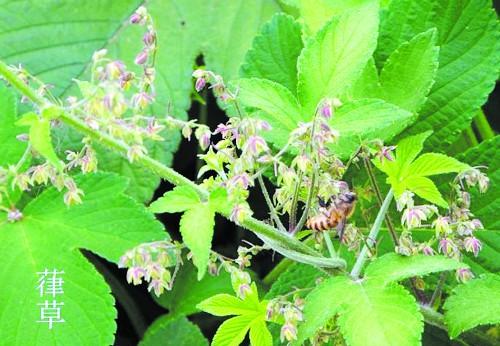
After the autumn, the weather begins to become cooler, and the time for citizens to watch the flowers and grass outdoors also increases. But at this time, many people's bodies began to be "sub-healthy": red skin, itching, sneezing, runny nose... Recently, the number of allergy patients in the Department of Allergic Reactions of Chengdu Integrative Traditional Chinese and Western Medicine Hospital (Chengdu First Hospital) has increased significantly, and they all have the above symptoms. At first, many people thought that it was climate change, lack of exercise, and poor health, but doctors reminded everyone that the main culprit of allergies was a very common weed in Chengdu in autumn - turnip.
A common plant:
Always "harming others" in secret
In the countryside, it is called "Lala Straw", which likes to wrap around the plants around it, and most of the gardens and weeds in most communities have it, and sometimes it seems a little "small". This lush-looking plant blooms "quietly" in early autumn.
The flowers of the grass are small and not fragrant, but they can use the wind to get the pollen into the air, and they can also drift far, so it induces allergic rhinitis, allergic asthma and skin allergies, which is very painful. Rhinitis can make the nose out of breath, making people dizzy and swollen; asthma makes people spasm in the human tract and difficult to breathe. At this time, most people will doubt their "sub-health" because of the discomfort of the nose, or have a cold, and some severe cases may suffocate.
What happened to a citizen:
Every year in August there is a "cold"
Few people know that this common and lowly plant, such a common and lowly plant, is so harmful!
Chengdu citizen Xiao Liu's nightmare began 3 years ago. One day at the end of August of that year, he suddenly began to sneeze, run a nose, and itch his eyes, thinking that he had a cold, and he had "dragged the disease away" hard. However, every August after that, Xiao Liu would inexplicably "catch a cold", which made him finally realize that something was wrong. At the suggestion of a friend, Xiao Liu came to the allergic reaction department of a city hospital for treatment, and after an allergen examination, he was diagnosed with autumn hay fever, including allergic rhinitis and allergic conjunctivitis. After further confirmation by the doctor, it was finally found that Xiao Liu was allergic to a substance - the pollen of the grass spread across the corner of the Chengdu community and the water in front of the mountain.
A set of methods of protection:
These symptoms are immediately sought medical attention
The pollen season is the busiest time in the allergic department of a city hospital. The doctor Yang Lihong reminded everyone: after the autumn, if everyone has suspicious symptoms such as itching, inexplicable "cold", red eyes, etc., we must go to the hospital in time to do allergen testing to determine whether they are allergic, so that they can stay away from allergens in time, avoid deterioration of the condition, and make themselves better as soon as possible.
Yang Lihong said that the main symptoms of pollen allergy are as follows:
1. Allergic rhinitis: sneezing, runny nose, itchy nose, nasal congestion.
2. Allergic conjunctivitis: itchy eyes, red eyes, tears.
3. Allergic asthma: repeated cough, wheezing, chest tightness, shortness of breath.
4. Facial dermatitis: repeated appearance of erythema, rash and itchy skin.
So, how to prevent pollen allergies?
1. Stay away from allergens. During the pollen spread period, especially in windy weather, try not to go out, close the doors and windows; if you need to go out, wear windproof glasses and masks; before going home, shake off the dust on your coat.
After entering the door, wash your face and rinse your mouth, use normal saline to rinse your nasal cavity, and remove the pollen on the surface of the skin during the outing; 2. Take medicine if you are sick. If symptoms occur, you need to go to the hospital and take medicine as directed by your doctor.
3. Desensitization treatment. Hay fever often occurs every year, and it is getting heavier and heavier every year, so it is necessary to go to the hospital for desensitization treatment. Desensitization therapy can change the course of allergy and is the only treatment for allergens, which can completely treat hay fever and prevent the occurrence of asthma.
Cao Yisha reporter Deng Xiaohong
Source: Chengdu Daily